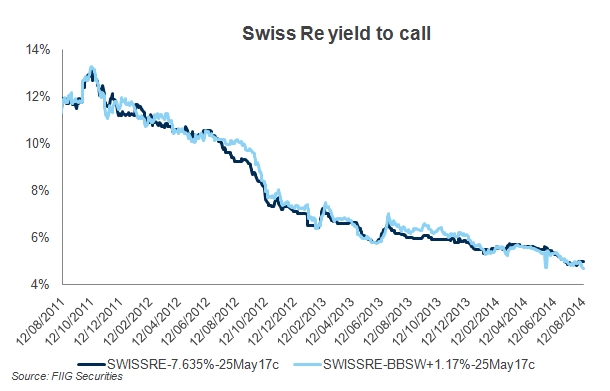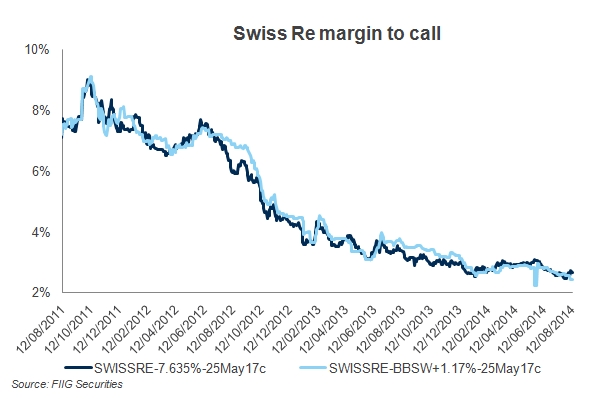by
Justin McCarthy | Aug 12, 2014
Key points
1. Swiss Re announced its second quarter results to 30 June, 2014, (2Q14) last Wednesday with a headline net profit after tax of US $802m for the quarter, up from USD $786 in 2Q13.
- Despite reporting consistently strong results (in part due to benign natural catastrophe occurrence in recent times) and the undoubted high credit quality of Swiss Re and their Tier 1 perpetual securities, investors should assess whether it is time to cash in with many sitting on large profits and double digit annual holding period returns.
3. Swiss Re Tier 1 securities (in AUD and non-AUD) are viewed as fair value at current levels but offer little upside with ever-present downside risk. Re-insurance is a far more volatile type of insurance that incorporates an element of luck. If an event such as Hurricane Katrina or a number of sizeable natural catastrophes all occurred in a short timeframe, significant losses and capital reductions could occur which could impact credit ratings, credit spreads and regulatory call decisions
Swiss Re announced another strong quarterly result last Wednesday with a net profit of USD 802m for 2Q14, up slightly on 2Q13 result of USD 786m but down on 1Q14 of USD 1,226m.
The full details, including investor presentations, can be viewed at the following link
The company is on track to record a third consecutive full year profit of more than USD 4bn, an impressive achievement. However, we note that low natural catastrophe payouts and relatively strong investment returns (in a low interest rate environment) are increasingly important factors in the result.
The company reported tough conditions in natural catastrophe renewals, which often occurs following a period of low natural catastrophe events/insurance claims. There has been some suggestion that underwriting standards have been lowered in order to increase the volume of business written, which would result in an increase in risk of the insurance book.
As highlighted in our recent updates, the company continues to return capital to shareholders with special dividends and other capital management activities. As a result, shareholders’ equity fell from USD 33.9bn to USD 32.5bn over the quarter, mainly as a result of USD 3.1bn in dividend payments more than offsetting the USD 802 net profit for the quarter and other unrealised gains on investments of USD 900m.
While Swiss Re maintains a very high capital buffer and we do not expect management to jeopardise its credit rating, any reduction in the equity/capital buffer is negative for bond holders.
Relative value summary
Overall, the 2Q14 results were a continuation of a very strong profitability streak for Swiss re that dates back almost three years. This strong performance has allowed the company to return capital to shareholders and maintain the current credit ratings. However, the environment for reinsurers is clearly getting tougher and investors are encouraged to assess whether it is time to cash in on one of the best performing fixed income investments over the past few years (as demonstrated by the charts below which plot the yield to call and margin to call of the AUD fixed and floating Tier 1 perpetual securities).

Figure 1

Figure 2
With the strong rally in credit over the past year, the Swiss Re Tier 1 perpetual securities (in AUD and non-AUD) are viewed as fair value and not particularly expensive given the lack of alternatives at similar yield. However, investors in the money or wanting to remove any call risk may consider taking profits.
Reinsurance is a far more volatile type of insurance that incorporates an element of luck. If an event such as Hurricane Katrina or a number of sizeable natural catastrophes all occurred in a short timeframe, significant losses and capital reductions could occur which could impact credit ratings, credit spreads and regulatory call decisions.
While the Tier 1 securities are assessed as fair value at current levels, they offer little upside but with ever-present downside risk inherent in reinsurance.
The fixed and floating AUD Swiss Re Tier 1 perpetual securities with a call date of 25 May 2017 are available wholesale investors only in minimum (face value) parcels sizes of $100,000.There are also a number of other issues in non-AUD available to wholesale investors in various minimum parcel sizes. Please contact your FIIG representative if you require any further information.
All prices and yields are a guide only and subject to market availability. FIIG does not make a market in these securities.
Copyright The contents of this document are copyright. Other than under the Copyright Act 1968 (Cth), no part of it may be reproduced or distributed to a third party without FIIG’s prior written permission other than to the recipient’s accountants, tax advisors and lawyers for the purpose of the recipient obtaining advice prior to making any investment decision. FIIG asserts all of its intellectual property rights in relation to this document and reserves its rights to prosecute for breaches of those rights.
Disclaimer Certain statements contained in the information may be statements of future expectations and other forward-looking statements. These statements involve subjective judgement and analysis and may be based on third party sources and are subject to significant known and unknown uncertainties, risks and contingencies outside the control of the company which may cause actual results to vary materially from those expressed or implied by these forward looking statements. Forward-looking statements contained in the information regarding past trends or activities should not be taken as a representation that such trends or activities will continue in the future. You should not place undue reliance on forward-looking statements, which speak only as of the date of this report. Opinions expressed are present opinions only and are subject to change without further notice.
No representation or warranty is given as to the accuracy or completeness of the information contained herein. There is no obligation to update, modify or amend the information or to otherwise notify the recipient if information, opinion, projection, forward-looking statement, forecast or estimate set forth herein, changes or subsequently becomes inaccurate.
FIIG shall not have any liability, contingent or otherwise, to any user of the information or to third parties, or any responsibility whatsoever, for the correctness, quality, accuracy, timeliness, pricing, reliability, performance or completeness of the information. In no event will FIIG be liable for any special, indirect, incidental or consequential damages which may be incurred or experienced on account of the user using information even if it has been advised of the possibility of such damages.
FIIG provides general financial product advice only. As a result, this document, and any information or advice, has been provided by FIIG without taking account of your objectives, financial situation and needs. Because of this, you should, before acting on any advice from FIIG, consider the appropriateness of the advice, having regard to your objectives, financial situation and needs. If this document, or any advice, relates to the acquisition, or possible acquisition, of a particular financial product, you should obtain a product disclosure statement relating to the product and consider the statement before making any decision about whether to acquire the product. Neither FIIG, nor any of its directors, authorised representatives, employees, or agents, makes any representation or warranty as to the reliability, accuracy, or completeness, of this document or any advice. Nor do they accept any liability or responsibility arising in any way (including negligence) for errors in, or omissions from, this document or advice. Any reference to credit ratings of companies, entities or financial products must only be relied upon by a ‘wholesale client’ as that term is defined in section 761G of the Corporations Act 2001 (Cth). FIIG strongly recommends that you seek independent accounting, financial, taxation, and legal advice, tailored to your specific objectives, financial situation or needs, prior to making any investment decision. FIIG does not make a market in the securities or products that may be referred to in this document. A copy of FIIG’s current Financial Services Guide is available at www.fiig.com.au/fsg.
An investment in notes or corporate bonds should not be compared to a bank deposit. Notes and corporate bonds have a greater risk of loss of some or all of an investor’s capital when compared to bank deposits. Past performance of any product described on any communication from FIIG is not a reliable indication of future performance. Forecasts contained in this document are predictive in character and based on assumptions such as a 2.5% p.a. assumed rate of inflation, foreign exchange rates or forward interest rate curves generally available at the time and no reliance should be placed on the accuracy of any forecast information. The actual results may differ substantially from the forecasts and are subject to change without further notice. FIIG is not licensed to provide foreign exchange hedging or deal in foreign exchange contracts services. The information in this document is strictly confidential. If you are not the intended recipient of the information contained in this document, you may not disclose or use the information in any way. No liability is accepted for any unauthorised use of the information contained in this document. FIIG is the owner of the copyright material in this document unless otherwise specified.
The FIIG research analyst certifies that any views expressed in this document accurately reflect their views about the companies and financial products referred to in this document and that their remuneration is not directly or indirectly related to the views of the research analyst. This document is not available for distribution outside Australia and New Zealand and may not be passed on to any third party without the prior written consent of FIIG. FIIG, its directors and employees and related parties may have an interest in the company and any securities issued by the company and earn fees or revenue in relation to dealing in those securities.